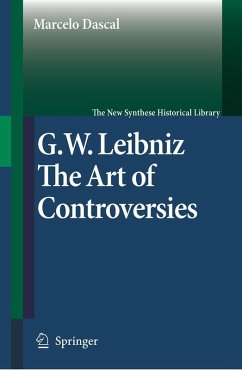From the reviews:
"This book is an invaluable contribution to the history of (philosophical) ideas and also a contribution to the pragmatics of discussion and debate, including argumentation (in the vernacular sense) and logic. ... should be read by philosophers of language (as well as historians of philosophy) as well as by pragmaticians and more generally by those who are concerned by the standards of public debates." (Anne Reboul, Linguist List, April 2009)
"[...] an impressive scholarly achievement and an indispensable tool for understanding Leibniz's thinking on form and function of controversies." (Gerd Fritz, University of Gießen, Germany, Journal of Historical Pragmatics 9:1, 2008)
"The Art of Controversies is an outstanding collection of the most important Leibniz texts concerning his life-long obsession: the art of reasoning not merely in mathematics, but also and above all in human conflict. In the vast amount of existing literature on Leibniz, this book is a must-read." (Bernardino Orio de Miguel, Catedrático de Filosofía, 2008)
"This book ... in its 45 chapters, newly translated or retranslated Leibnizan texts in which the philosopher pursues his lifelong passion for analyzing and refining the logical structure and practical conduct of intellectual debate. ... This volume promises to function as a rich and important resource not only for Leibniz scholars and for scholars of early modern philosophy generally, but also for philosophers ... . It should also prove valuable to historians of ideas, theorists of argumentation, logicians, and scholars of rhetoric." (Véronique M. Fóti, The Review of Metaphysics 61:2, 2007)
"[...] is a treasure trove for scholars interested in Leibniz's practical rationality and his practical action in general. [...] All in all, this is a very rich collection of translations of mostly unknown texts which will give food for thought for a longtime to come and will inspire scholars to dig deeper into this most interesting and ignored area of Leibniz's thought." (Markku Roinila, Studia Leibnitiana, Band XXXVIII/XXXIX, Heft 2, 2006/2007)
"This book is an invaluable contribution to the history of (philosophical) ideas and also a contribution to the pragmatics of discussion and debate, including argumentation (in the vernacular sense) and logic. ... should be read by philosophers of language (as well as historians of philosophy) as well as by pragmaticians and more generally by those who are concerned by the standards of public debates." (Anne Reboul, Linguist List, April 2009)
"[...] an impressive scholarly achievement and an indispensable tool for understanding Leibniz's thinking on form and function of controversies." (Gerd Fritz, University of Gießen, Germany, Journal of Historical Pragmatics 9:1, 2008)
"The Art of Controversies is an outstanding collection of the most important Leibniz texts concerning his life-long obsession: the art of reasoning not merely in mathematics, but also and above all in human conflict. In the vast amount of existing literature on Leibniz, this book is a must-read." (Bernardino Orio de Miguel, Catedrático de Filosofía, 2008)
"This book ... in its 45 chapters, newly translated or retranslated Leibnizan texts in which the philosopher pursues his lifelong passion for analyzing and refining the logical structure and practical conduct of intellectual debate. ... This volume promises to function as a rich and important resource not only for Leibniz scholars and for scholars of early modern philosophy generally, but also for philosophers ... . It should also prove valuable to historians of ideas, theorists of argumentation, logicians, and scholars of rhetoric." (Véronique M. Fóti, The Review of Metaphysics 61:2, 2007)
"[...] is a treasure trove for scholars interested in Leibniz's practical rationality and his practical action in general. [...] All in all, this is a very rich collection of translations of mostly unknown texts which will give food for thought for a longtime to come and will inspire scholars to dig deeper into this most interesting and ignored area of Leibniz's thought." (Markku Roinila, Studia Leibnitiana, Band XXXVIII/XXXIX, Heft 2, 2006/2007)

